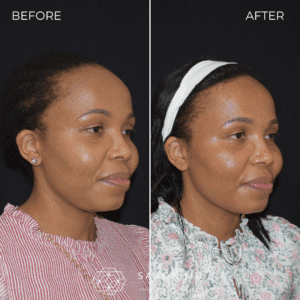10 Things People With Big Foreheads Should Know
Facial balance is something most of us notice right away when looking at ourselves or others. For some people, the forehead becomes the most noticeable feature. Many people genuinely wonder what causes a larger forehead and what can be done about it. The truth? A big forehead is not necessarily a flaw. In fact, it can be a striking, elegant feature. But if you feel self-conscious, you’re not alone, and you do have options.
Here are 10 things people with big foreheads should know—including causes, myths, styling tips, and solutions both temporary and permanent.
1. What Actually Makes a Forehead Look Big
A “big” forehead doesn’t always mean an abnormally large skull. In facial aesthetics, proportions matter more than size in isolation. The face is often divided into three equal sections:
Upper third: hairline to eyebrows
Middle third: eyebrows to the base of the nose
Lower third: base of the nose to the chin
If the upper third appears noticeably longer than the middle and lower thirds, the forehead can look “big.”
Factors that make the forehead look bigger include:
Hairline position: A high hairline or one that recedes with age makes the forehead look longer.
Bone shape: A convex frontal bone projects outward, creating a more prominent appearance.
Facial ratios: If the chin or midface is smaller than average, the forehead appears larger by comparison.
Hair density: Thin hair, even without hair loss, creates less frame for the face, exposing more forehead.
So, when people say “big forehead,” they might actually be describing different things: hairline height, forehead length, or overall proportions.
2. Genetics Play a Big Role
If you’ve always had a higher hairline or broader forehead, chances are it runs in the family. Genes determine skull shape, hairline position, and hair density.
Some families naturally pass down a high, M-shaped hairline or a broad, square forehead. Others may carry genes for early hair thinning, which can exaggerate forehead size over time.
This is why people with big foreheads often find that parents, siblings, or grandparents share the same feature. It doesn’t mean there’s anything “wrong”—it’s simply how your face is uniquely designed.
3. Traction Alopecia Can Make Foreheads Look Bigger
Not all foreheads are “big” by bone structure or genetics—sometimes it’s a hair problem. Traction alopecia is a type of hair loss caused by repeated pulling or tension on the hair over time.
Common causes include:
Tight hairstyles such as braids, ponytails, buns, or extensions
Frequent use of wigs or weaves that tug at the hairline
Headwear that constantly rubs or pulls at the scalp
The result? Hair loss around the temples and frontal hairline, which creates the illusion of a larger forehead.
The good news: traction alopecia is often preventable and sometimes reversible if caught early. Loosening hairstyles, reducing tension, and avoiding harsh chemicals can help hair regrow. For more advanced cases, treatments like PRP and PRF therapy, medications, or even hair transplantation may be recommended.
For many people with big foreheads due to traction alopecia, simply addressing the hairline can restore balance without surgery.
4. People With Big Foreheads Aren’t Alone
A larger forehead is one of the most common facial proportions worldwide. Hairline height varies widely among populations, and many people notice forehead changes over time due to:
Hair thinning (in both men and women)
Aging (skin and soft tissue shift, changing facial balance)
Hairstyle trends (pulled-back looks make the forehead more visible)
In fact, people with big foreheads often come across more frequently in conversations about beauty because it’s such a common trait. That’s why you’ll see endless hairstyle guides and makeup tutorials specifically created for people with big foreheads—it’s far from rare.
5. A Big Forehead Can Be Considered Attractive
Beauty standards aren’t universal. In some cultures, a broad forehead symbolizes intelligence, elegance, and even good fortune. In the fashion and entertainment world, models and celebrities with big foreheads are celebrated for their striking, memorable look.
Think about stars like:
Rihanna – who wears her high forehead proudly and often with slicked-back hairstyles.
Tyra Banks – whose larger forehead has become one of her most iconic features.
Angelina Jolie – admired worldwide for her striking bone structure, including her prominent forehead.
The takeaway: people with big foreheads can absolutely be considered beautiful. Sometimes, it’s less about the feature itself and more about how it’s styled and carried with confidence.

6. Hairstyles Can Make a Huge Difference
Hairstyles are one of the easiest ways to balance forehead proportions. A skilled stylist can completely change how your forehead appears.
Best hairstyles for people with big foreheads include:
Side-swept bangs: Add diagonal lines that shorten the appearance of the forehead.
Curtain bangs: Frame the face and soften a tall forehead.
Layered styles with temple volume: Add balance to the sides of the face.
Pixie cuts with texture: Draw focus to the eyes rather than the forehead.
Styles to approach carefully:
Middle parts with flat hair: These can elongate the forehead visually.
Slicked-back ponytails or buns: Unless you’re intentionally highlighting your forehead, they tend to accentuate it.
Bottom line: the right cut can make your forehead look balanced without surgery or makeup.
7. Makeup Tricks Can Help Too
Makeup is an underrated tool for people with big foreheads. Just like contouring can slim a nose or define cheekbones, it can alter the appearance of the forehead.
Pro tips include:
Contour along the hairline with a matte bronzer one shade deeper than your skin tone. This creates the illusion of a shorter forehead.
Highlight the center of the face—cheekbones, chin, and nose—to draw the eye downward.
Bold brows frame the forehead and break up vertical space.
Defined lips balance proportions by pulling attention lower.
Small tweaks in makeup can create big changes in how your forehead looks to others.
8. Non-Surgical Options Exist
Not everyone wants or needs surgery. For some, non-surgical options can make a meaningful difference:
Hair restoration treatments: PRP and PRF injections or medications like minoxidil can thicken hair, making the forehead appear smaller.
Hair transplants: Moving hair follicles from the back of the scalp to the front can lower the hairline, though density may not perfectly match natural growth.
Camouflage techniques: Strategic use of hair fibers or microblading at the hairline can create the look of a lower, fuller hairline.
These options are best for people who want improvement without downtime, though results are usually more subtle than surgery.
9. Forehead Reduction Surgery Is a Permanent Fix
For those seeking a long-term, dramatic change, forehead reduction surgery (hairline lowering) is highly effective.
How it works:
A fine incision is made along the hairline.
The scalp is carefully advanced forward to shorten the forehead.
The incision is closed so that the scar is hidden in the hairline.
Benefits:
Immediate, permanent results
Short recovery (about 1–2 weeks for initial healing)
Natural outcome when performed by an experienced surgeon
In some cases, patients combine forehead reduction with hair grafting to refine the temples or with brow bone contouring if bone shape contributes to prominence.
It’s important to choose a board-certified facial plastic surgeon experienced in this procedure for the best, most natural outcome.

10. Confidence Is What Matters Most
Here’s the final—and most important—thing: whether you have a big forehead or not, confidence is everything.
Some people with big foreheads decide to embrace it fully, even making it part of their signature look. Others prefer to use hairstyles, makeup, or hats to minimize it. And still others opt for permanent solutions like surgery.
There’s no right or wrong choice. What matters most is how you feel about your face. If a big forehead makes you self-conscious, know that safe, effective solutions exist. And if you choose to keep it as part of your look, remember that many admired icons share the same feature.
Final Thoughts
People with big foreheads often worry more than they need to. While a larger forehead might feel like it dominates your appearance, there are countless ways to style, enhance, or even surgically correct it. From bangs and contouring to hairline lowering surgery, the options are there—you just need to decide which fits your lifestyle and goals best.
At the end of the day, your forehead is just one part of your unique beauty. And with today’s techniques, you’re in control of how much or how little attention it gets.
You May Also Like:
- The Best Surgical Options to Reduce a Big Forehead
- Forehead Reduction Surgery Cost: Everything You Need to Know Before Surgery
- What Makes Up a Feminine Forehead
- How to Camouflage Your Hairline Lowering Incision After Surgery
- How to Reshape A Sloped Forehead
- Brow Bone Reduction for Women with Frontal Bossing: Is It Worth It?
- Hairline Lowering Before and After Gallery

Dr. Sarah Saxon
Dr. Sarah Saxon is a double board-certified facial plastic surgeon with offices in Austin and Dallas, TX. She specializes in procedures that create facial harmony, including forehead reduction (hairline lowering), brow bone contouring, and jawline surgery. Dr. Saxon has helped countless people with big foreheads feel more confident by offering both surgical and non-surgical solutions tailored to their goals. Her passion is delivering natural results that enhance each patient’s unique features.